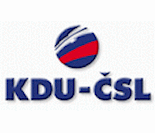KDU-CSL: Christian Democratic Union - Czechoslovak People's Party
 The Czechoslovak People's Party goes back to the days of the foundation of Czechoslovakia in 1918 as a conservative, largely Catholic party. The party survived the communist regime, but only nominally, as part of the so-called "National Front". It began to function again as a fully independent party after the Velvet Revolution. In 1992 it changed its name to the Christian Democratic Union - Czechoslovak People's Party, partly as a way of distancing itself from the communist past. The party served as a junior partner in the two governments led by Vaclav Klaus, between July1992 and January 1998, and the party also took part in the interim government between January and August 1998. Since then it has been in opposition and since 1999 it has been in a close pact with the Freedom Union (see above). In English the party's name is often abbreviated to "The Christian Democrats".
The Czechoslovak People's Party goes back to the days of the foundation of Czechoslovakia in 1918 as a conservative, largely Catholic party. The party survived the communist regime, but only nominally, as part of the so-called "National Front". It began to function again as a fully independent party after the Velvet Revolution. In 1992 it changed its name to the Christian Democratic Union - Czechoslovak People's Party, partly as a way of distancing itself from the communist past. The party served as a junior partner in the two governments led by Vaclav Klaus, between July1992 and January 1998, and the party also took part in the interim government between January and August 1998. Since then it has been in opposition and since 1999 it has been in a close pact with the Freedom Union (see above). In English the party's name is often abbreviated to "The Christian Democrats".
The KDU-CSL is a traditional, conservative, Roman Catholic-based party. It defines itself as right of centre, but in many respects it is closer to the Social Democrats than the other right-wing parties. Like the Freedom Union - Democratic Union, the party is pro-European Union and is strongly in favour of direct presidential elections. On some social issues, such as the question of legalising homosexual partnerships, it is conservative, consistent with its Catholic tradition. The KDU-CSL and the Freedom Union-Democratic Union have put forward a common right-of-centre pre-election manifesto with a strong focus on the battle against corruption and on the rule of law.
The party appeals particularly to Catholic voters and to conservative voters in small towns and rural areas. It enjoys strong and stable support in rural parts of Moravia (the eastern part of the Czech Republic).
KDU-CSL, a party that traces its roots to the 19th century, had been in all but one Czech government since 1989. It was one of the three parties that formed the Czech government led by PM Topolanek. However, the party's role as the key coalition partner to both the right and the left -- and an important power-broker -- had done little for KDU-CSL's success at the ballot box. Since the turn of the century, the party saw its membership base shrink from 80,000 to 40,000 and its popularity plunged dangerously close to the five-percent threshold for entry into the parliament. The party's chairman, Jiri Cunek, wasn weakened by a corruption scandal and continued to struggle for political survival, despite his return to the government as DPM. The party itself was divided into two warring wings and splintered in even more ways over its policy agenda.
An important element in the party's deteriorating fortunes is a decisive split in its ranks and policy orientation. As former KDU-CSL chairman Miroslav Kalousek put it: "We must decide whether we are Western European-style Christian democrats or church-going socialists." For Kalousek and his followers, the choice was clear: the party should cast itself as a conservative party focused on family values, personal responsibility, and reining in public spending. For many others, including Cunek, the party must continue to advocate policies that support families, including tax breaks, healthcare and education. The tension between these two opposing visions was on display at the congress and was in large part responsible for the less-than-inspired and watered-down final communique.
|
NEWSLETTER
|
| Join the GlobalSecurity.org mailing list |
|
|
|

